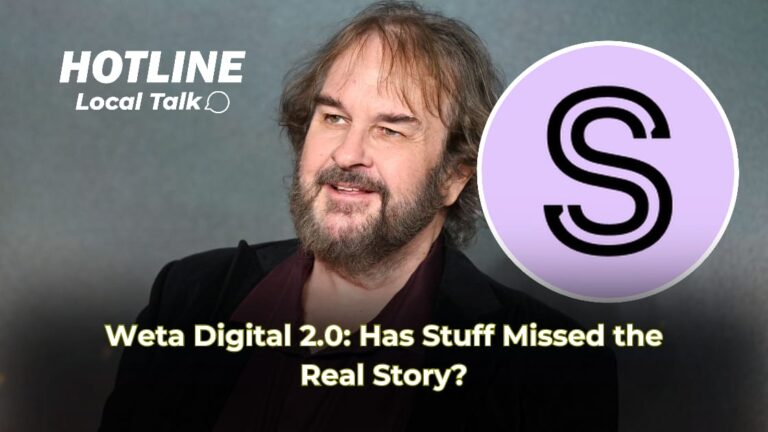TODAY in
STUFF
YOU NEED
TO KNOW….Peter Jackson, the visionary behind The Lord of the Rings, is no stranger to making money and winning the hearts and minds of generations. Both in WLG and pretty much every pixel on a phone. Weta Digital, has long been a global leader in visual effects, crafting iconic worlds like Middle-earth and Pandora. In 2021, Jackson sold Weta Digital’s technology division to Unity, a massive American gaming company, for a staggering $2.3 billion. It is rumoured 1b landed in Jackson’s personal bank account, not that any of our business. The deal sent shockwaves through the industry. STUFF, previously, one of New Zealand’s biggest news outlets, splashed the story across its pages, framing it as a monumental exit for Jackson. But now, whispers are growing louder in Wellington’s creative circles. Has STUFF missed the bigger story as its journalists are leaving and its being squeezed? Jackson, it seems, is quietly building something new—Weta Digital 2.0. By hiring back engineers and reigniting his digital dreams, is Jackson having another bite at the cherry. So, what’s really going on? Let’s dive in.
First, let’s rewind and go where no media outlet. Weta Digital, founded by Jackson in 1993, changed filmmaking forever. Its tools brought Gollum’s tormented eyes to life and made Avatar’s Na’vi feel real. The company’s tech was a marvel, blending art and science to push boundaries. When Unity swooped in, it wasn’t just buying tools—it was grabbing Weta’s pipeline, software, and 275 engineers. Stuff’s headline screamed of a $2.3 billion deal, painting it as Jackson cashing out. The article focused on the numbers, the glitz, and the idea that Weta’s tech would now fuel Unity’s gaming empire. Fair enough, it was big news. But the story didn’t dig deeper. It didn’t ask what Jackson might do next. And that’s where things get interesting.
Now, fast forward to today. Word on the street is that Jackson isn’t done. Far from it. Sources close to Wellington’s film scene say he’s been quietly hiring back engineers—many of whom worked at Weta Digital before the sale. These aren’t just any hires. They’re the brains behind tools like Manuka and Loki, the software that made Weta a legend. Why bring them back? Simple. Jackson’s building something new. Insiders call it Weta Digital 2.0, a fresh venture to rival the original. Unlike Unity, which seems focused on gaming and the vague buzzword of “the metaverse,” Jackson’s vision is rooted in storytelling. He wants to create tools for filmmakers, artists, and dreamers—not just coders chasing virtual worlds.
So, what’s driving this? For starters, Jackson’s no ordinary businessman. He’s a storyteller at heart. Selling Weta’s tech to Unity wasn’t about retiring to a beach. It was about freeing up resources to dream bigger. The sale left WetaFX, the visual effects arm, intact under Jackson’s control. With about 1,700 staff, WetaFX is still a powerhouse, working on films like Avatar: The Way of Water. But Jackson’s not stopping there. By hiring back engineers, he’s laying the groundwork for a new tech hub. Think of it as Weta Digital reborn—smarter, leaner, and laser-focused on creative tools. This isn’t just a sequel. It’s a reinvention.
Meanwhile, Unity’s side of the story raises eyebrows. The American giant promised to “democratise” Weta’s tools, making them available to millions. Sounds noble, right? But dig a bit, and cracks appear. Since the sale, Unity’s faced its own troubles. Its share price has tanked—down over 80% from its peak. Last year, it axed 265 Weta Digital staff, calling them redundant. Ouch. Then there was the backlash over proposed user fees, which sparked outrage among developers. Unity’s vision for Weta’s tech feels muddled. Are they building games? Virtual worlds? Nobody’s quite sure. And that’s where Jackson’s move shines. While Unity stumbles, he’s picking up the pieces—literally.
Let’s be clear. Jackson’s not just hiring back engineers for nostalgia. He’s got a plan. Wellington’s buzzing with talk of a new studio, one that could blend Weta’s old magic with cutting-edge tech. Imagine tools that let filmmakers craft worlds faster, cheaper, and with more heart. That’s the rumour, at least. One source, a former Weta coder, spilled the beans over coffee in Miramar. “Peter’s obsessed with giving artists control,” they said. “He thinks Unity’s missing the point. They’re chasing gamers, not storytellers.” If true, this could be huge. Jackson’s betting that the future of digital creation lies in empowering creatives, not just tech bros.
Now, let’s talk about Stuff. Their 2021 article wasn’t wrong—it laid out the sale’s basics. Unity paid $1 billion in cash and $625 million in stock. WetaFX stayed independent. Jackson pocketed a fortune. All true. But the piece stopped short. It didn’t probe what Jackson might do with that cash or why he’d let go of Weta’s tech in the first place. Instead, it leaned into the “local hero sells out” angle, missing the spark of what’s unfolding now. Stuff’s reporters are sharp, but this time, they didn’t see the forest for the trees. The real story isn’t the sale. It’s what Jackson’s doing next.
Why does this matter? Because Wellington’s more than a film hub—it’s a creative crucible. Weta Digital put the city on the map. Its success drew talent from across the globe, turning Miramar into “Wellywood.” If Jackson’s building Weta Digital 2.0, it’s not just about him. It’s about jobs, innovation, and keeping New Zealand at the forefront of digital arts. Unity’s layoffs hit hard—265 Kiwis lost their gigs. Jackson’s hiring spree could flip that script, bringing talent back and boosting the local economy. Plus, there’s pride at stake. If Weta 2.0 takes off, it’ll show the world that Kiwi ingenuity still rules.
Of course, it’s not all rosy. Building a new tech company is risky. Jackson’s got cash, sure, but he’s up against giants. Unity, despite its woes, has deep pockets. Then there’s Epic Games, whose Unreal Engine dominates gaming and film. Can Weta Digital 2.0 compete? Nobody knows. Some say Jackson’s biting off too much, that he should stick to directing. Others argue he’s the only one bold enough to try. Either way, the stakes are high. If he pulls it off, he’ll cement his legacy as more than a filmmaker—a true innovator.
Let’s zoom out. The sale to Unity was a moment, not the end. Jackson’s always been a step ahead. When he made The Lord of the Rings, nobody thought a Kiwi could pull off a trilogy that size. He proved them wrong. When Weta Digital tackled Avatar, sceptics scoffed at its ambition. Again, Jackson delivered. Now, with Weta Digital 2.0, he’s betting on himself once more. The engineers he’s hiring aren’t just workers—they’re his tribe, the ones who made Weta’s magic real. By bringing them back, he’s rebuilding a dream.
So, has Stuff dropped the ball? In a word, yes. Their article captured the sale’s flash but missed its heart. They didn’t ask what Jackson’s next move might be or why he’d sell in the first place. The real scoop is here, in Wellington’s studios and cafes, where talk of Weta Digital 2.0 is growing. Jackson’s not cashing out—he’s doubling down. Unity might have Weta’s old tools, but Jackson’s got the vision. And in this game, vision wins.
What’s next? Only time will tell. Jackson’s keeping tight-lipped, as usual. But the signs are clear. Engineers are trickling back. Rumours of a new studio are swirling. Wellington’s creative pulse is beating strong. If Weta Digital 2.0 becomes reality, it’ll be more than a company—it’ll be a statement. Jackson’s telling the world he’s not done creating. And for a man who turned hobbits into heroes, that’s a story worth watching.
In the end, Stuff’s piece was a snapshot, not the full picture. They saw the deal but missed the dream. Jackson’s Weta Digital 2.0 could redefine digital creation, putting Wellington back at the centre of it all. For now, the city waits, buzzing with hope. One thing’s certain—when Peter Jackson’s involved, the impossible feels just a step away.








